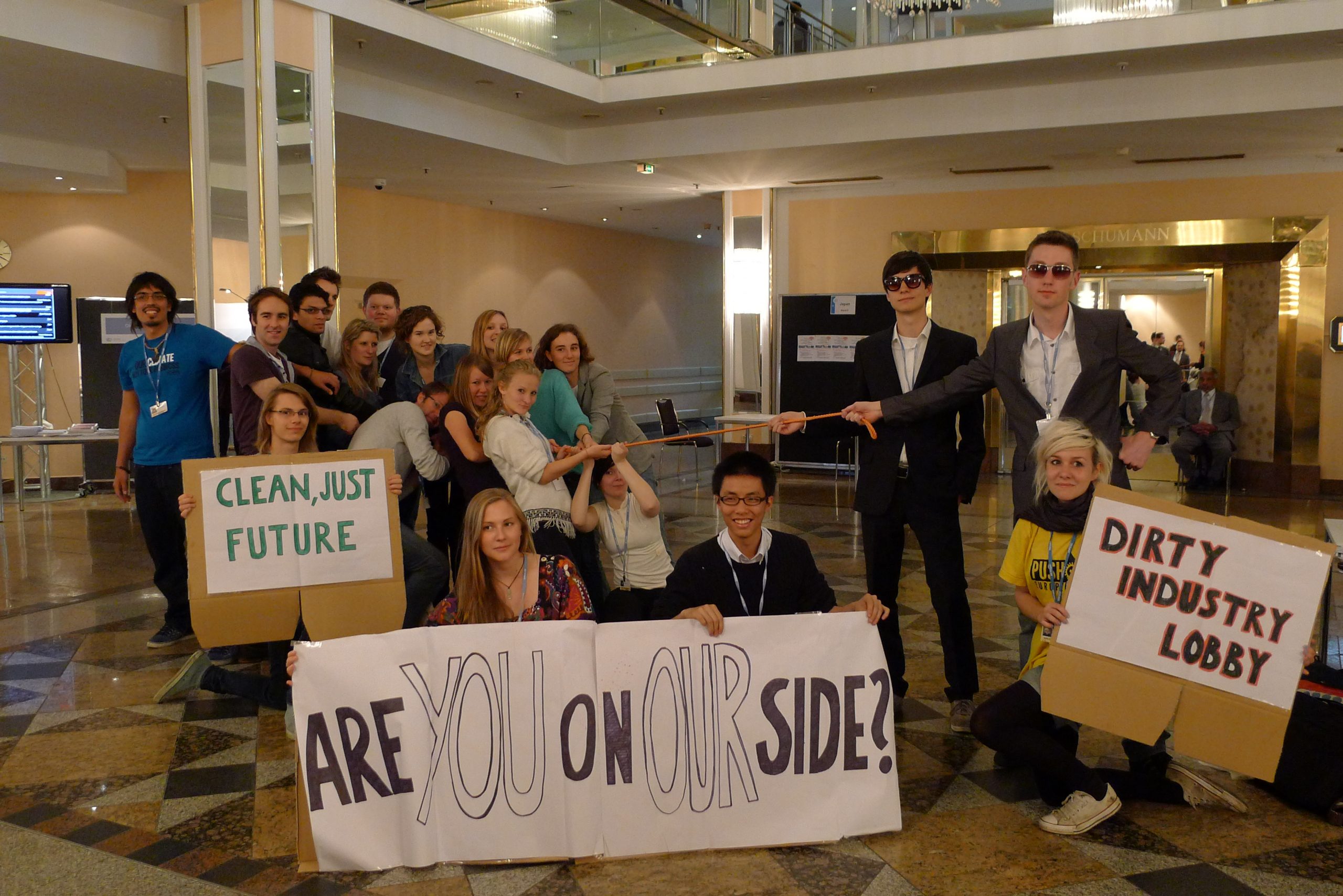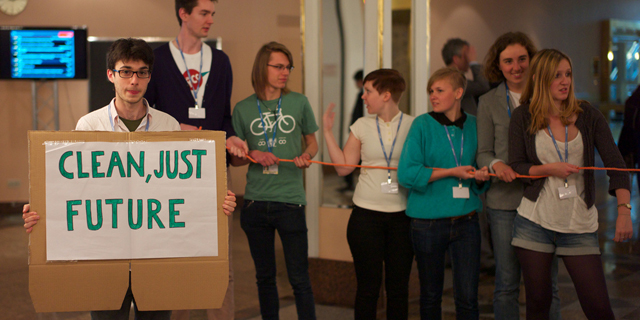For the past three years, I have always been attending the yearly sessions of the UN climate talks in Bonn, Germany, as part of the Young Friends of the Earth delegations. This time, I didn’t travel to Bonn and decided to follow the negotiations from home instead. I have to admit that I had very mixed feelings when I took this decision. I was sure I would miss the familiar halls of the Maritim Hotel, where the conference takes place each year, or the cosy atmosphere at the Max Hostel, which always becomes a hub for young climate activists from around the world during the time of the Bonn climate talks.
In fact, what I am really missing is seeing and working with the people that I have met at previous UN climate conferences. Many of these people have become my friends throughout the years in our common struggle for climate justice. But there is also the missed opportunity of meeting many new people that come to Bonn to get involved with the UN climate negotiations for the first time. Their energy and enthusiasm, especially from the amazing youth activists, have always been a motivation and inspiration for me to continue the sometimes very difficult and tiring engagement with the UNFCCC. So I told myself that if I don’t go to Bonn this year, I will at least try my best to follow the developments in the negotiations and support the work of the fantastic people that are on the ground as best as I could.
Keeping an eye on the negotiations
For the past week, I have been watching some of the sessions at the Maritim on the UNFCCC webcast. This is a really great way to directly follow what is happening. It’s like not going to the cinema but watching UN negotiations instead. Sounds fun, doesn’t it?!
With equity being the hot topic of the talks in Bonn, I watched a press briefing from Third World Network (TWN) about this issue. I could see (or better to say hear, because the camera didn’t turn to the audience) some of my friends from YOUNGO, the official youth constituency at the UNFCCC, ask the speakers on the panel some excellent questions. For example, Graham from Earth in Brackets asked how the equity principle could and should be embedded in the negotiations around the new Durban Platform for Enhanced Action (DPEA) that was launched in December at the last big climate summit in Durban, South Africa. Or Jamie from the UK Youth Climate Coalition (UKYCC) asked how the concept of equity could be operationalised and applied in the negotiations in order to make sure that it doesn’t just float around at the talks like an empty theoretical concept.
I also watched a full day workshop on the topic of “Equitable Access to Sustainable Development” where different countries or groupings of countries like the Alliance of Small Island States (AOSIS) or the EU, as well as some civil society groups and experts from scientific institutions or think tanks like the South Centre presented their views on equity. It was quite obvious that there was a big disparity in the understanding and interpretations of the concept.
TWN is, by the way, also writing very detailed daily articles about the different negotiating sessions. So if you prefer to read rather than to watch what the different countries are saying in the talks, you can check out the news on their website.
Reading articles by fellow activists
Another way of staying up to date about what’s going is to read some blogs. Marco from YFoEE who is in Bonn wrote a blog for the YFoEE homepage. There are also very good blogs from the Earth in Brackets delegation who have also posted the texts of all the interventions that YOUNGO has delivered in the past week. Interventions are short statements from civil society groups that directly address the negotiators and they are a great way to get your demands across.
Then there is the blog from the Adopt a Negotiator project where young people are blogging from specific country perspectives or the UKYCC blog. We can also see a good selection of blog posts from the above mentioned websites on the Push Europe site. Push Europe is a joint youth campaign where YFoEE plays a key part.
This is just a small selection of blogs that I have been reading over the last days. There are certainly many more out there. And then, of course, there is Facebook and Twitter. Now, I won’t start listing all the tweets or facebook status updates that I have been reading because, as you can imagine, I would never finish writing this blog in that case…
All this is just to say that in order to follow the UNFCCC negotiations, you don’t have to physically travel to the conference venues. You can just tap into all the resources that are out there in the World Wide Web and then spread the information further. I have used this tactic to help Marco, who is extremely busy running from one meeting to another and organising cool actions in Bonn, and put some news updates on the YFoEE facebook page last week. You should all go and like it, by the way 😉
Providing support to people on the ground
Apart from following and reporting about the negotiations, I have also supported Marco with some other communications work and helped drafting the press release for the amazing youth action on Friday.
In a tug of war game, activists from YFoEE, the European-wide Push Europe campaign and the broader international YOUNGO constituency have exposed the influence of industry lobbying and corporate capture of decision making in the UNFCCC which is preventing more progressive action to tackle the climate crisis in a way that would benefit the people all over the world. It was a very funny and creative way to show the imbalance of power between the 1% and the 99%.

During the action, the young activists encouraged negotiators to pick the right side and help the youth pull the rope in favour of a clean and just future and away from the corporate interests and profits. Marco from YFoEE and one of the Push Europe coordinators has written a nice article about this action on the Push Europe blog. You should also take a look at the YFoEE Flickr for some great action pictures.
In the end, with all the links and connections to the people in Bonn, I almost feel like being there myself. It is still a bit sad, of course, to do all the work alone in front of my computer in my flat in Berlin, but I really feel like I can participate and engage with the UN negotiations in a meaningful way, without being in Bonn.
Following the climate talks from home is a concept that we at YFoEE have applied for the two previous years during the COPs as well. COPs (Conferences of the Parties) are the big UN climate summits that usually take place at the end of the year. For COP 16 in Cancún, Mexico and COP 17 in Durban, South Africa, YFoEE had organised Cancun in Brussels and Durban in Brussels youth climate justice convergences that brought together young climate activists from all over Europe in Brussels during the time of the COP.
I am already looking forward to this year’s Qatar in Brussels youth convergence where we will again follow the UN negotiations in Doha from a central European hub in Brussels. Then, I won’t be doing it alone but with a bunch of other friends who won’t travel all the way to Qatar, but still want to get involved and active around the UN climate negotiations. I am sure we will have an impact through linking up with other youth activists who will be in on the ground in Doha and contribute to making the voice of young people heard from Brussels.
—
Susi Hammel is a member of the Young Friends of the Earth Europe Steering Group and Climate Justice Working Group

